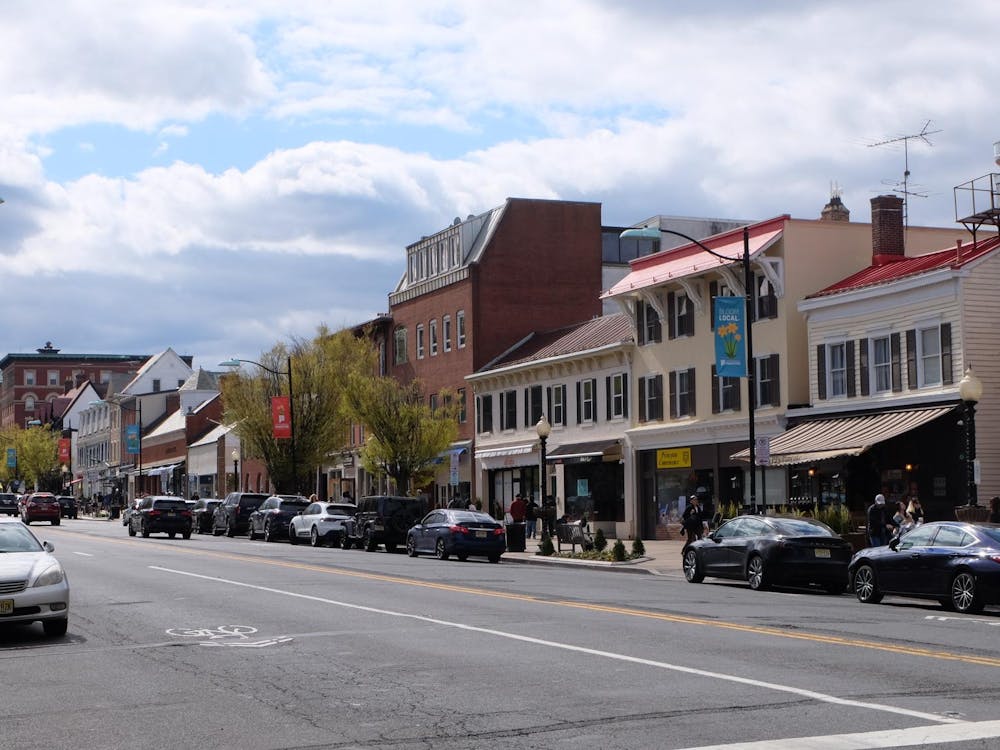Documentaries are a rich form of storytelling with the ability to mobilize the public and shape public policy, argued documentary filmmaker and editor Purcell Carson and TV producer and human rights law scholar Emily Holland ’01 in a panel Monday evening titled “The Role of Documentary in Shaping Public Policy.”
In her presentation Carson, a documentary production specialist for the Wilson School, described the historical evolution of documentaries and how recent changes have made them more competitive in today’s “hyper-saturated” media environments.
She began by playing a four-minute clip of a CBS news special from the ’60s called “Harvest of Shame,” which explored the plight of migrant farm workers. She linked the special to Davis Guggenheim’s 2006 hit film “An Inconvenient Truth.”
“Both were forms of advocacy journalism, which is the same in many ways across time,” she said. “Both films knew exactly what [social message] they wanted [to project].”
The two documentaries differ only organizationally, she explained, adding that the type of funder, the anticipated audience and the range of distribution for modern documentaries vary widely.
However, the emphasis of character in documentaries in the ’60s and ’70s saved the medium from being “the spinach in the media’s diet,” Carson said. While playing the trailer from the 1994 Sundance winner “Hoop Dreams,” a film following a five-year journey of two young men from the streets of the inner-city Chicago to the NBA, she said that character development is what gets funded and what people want see.
The next step for documentaries, Carson said, is reflected in an academic study called Beyond the Box Office, which showed how “An Inconvenient Truth” was used in schools and addressed in government debates so that the film’s producers could understand the social return on their investment. She said she considered the study the mark of a recent trend of documentary financiers like Sundance Films and the Fledgling Fund seeking metrics to evaluate the potential social impact of their investments.
Meanwhile, Holland shared anecdotes from her personal experience as a news producer to argue that the ability of documentaries to address subjects in depth is a unique freedom that is of immediate value to policymakers.
Having been involved in intense human rights projects overseas, such as working with genocide orphans and the South African Truth and Reconciliation Commission, Holland was ready by the second semester of her senior year at college to do something “more normal,” she said.
Following graduation, Holland went to work as an assistant news correspondent in New York City, where she explained that her conception of normal was turned upside down by the terrorist attacks of 9/11. She later assisted in the 24/7 coverage of the wars in Iraq and Afghanistan. It was at this job that she realized she desired to “look beyond the news of today to examine the news of tomorrow,” she said.
“You only have so much freedom to explore content with an hour-long timeslot that is broadcast and funded,” she said. “The news has breadth. But documentaries like ‘Fahrenheit 9/11’ and ‘Baghdad or Bust’ have depth and go much deeper on the issues we would like to address.”
Holland recounted her time as a producer at CNN, where she put together news packages dealing with powerful documentaries like “Normal People Scare Me” and “Born into Brothels,” as well as her work as a humanitarian journalist for an international rescue community where she shot, wrote and produced short advocacy films about child hunger, sexual violence and lack of education.

“It was difficult to collapse the difference,” she said, “because the story you told was never the story [audiences] wanted to hear.”
It was when Holland saw Lisa Jackson’s “The Greatest Silence,” a documentary about women raped in the Congo directed by a woman who had also been assaulted, she understood the value of documentaries as a medium.
“The movie did what we were trying to do ourselves,” she said. “[Jackson] took what was most personal and painful to her and offered a passport to a part of the world where it was happening all the time.”
Holland concluded by saying that politicians and public officials increasingly recognize the significance of documentaries. In her brief stint at the state department developing policy-planning on post-Arab Spring concerns in the Middle East and Africa, she said that the officials watched a documentary about Syria and had discussed it the next day.
“Policy makers can shuttle to the front lines through documentaries in an hour’s time when they may not have the opportunity to camp out in Syria for six weeks,” she said. “They can show them on a cellular level what is going on.”
Sociology major Allison Behringer ’12 said she found Holland and Carson’s panel discussion particularly inspiring.
“I enjoy journalism and traveling and would love to have a similar career,” she said, adding that she hopes to join Princeton in Africa after graduation. “It’s amazing just thinking where having a job like that could take you.”
The discussion, which was held in Robertson Hall and attended by about 40 students, faculty members and community members, was part of the Wilson School’s Media and Public Policy series.







